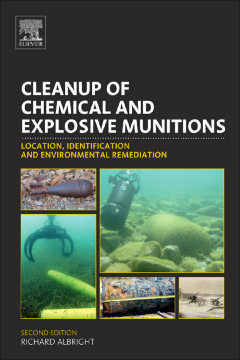
Additional Information
Book Details
Abstract
Unexploded military ordnance and toxic chemicals, some dating back to the two World Wars, are a global concern, especially when former military bases are redeveloped for housing or other civilian uses. Internationally, there are the added challenges of cleanup of battlegrounds and minefields. Experts estimate that the United States alone could spend between $50–250 billion to clean up these sites, many of which are in areas of high population density, where the demand for land for development is high.
This book is unique in providing detailed guidance for cleaning up military ordnance sites – listing explosives, chemical warfare materials and breakdown products which can contaminate soil and groundwater and the tests needed to detect them, as well as cleanup techniques. Also included are remote sensing techniques, geophysical techniques, safety issues, the particular challenges of chemical weapons, etc. The author illustrates these techniques with case studies, including former battlegrounds in Europe and Asia, storage and waste disposal sites in Russia and former Soviet territories, and an extended study of the remediation of the large and complex Spring Valley site in the District of Columbia,.
The second edition has been fully revised and updated, and also includes new and expanded sections on:
- geophysical techniques for discovering buried ordnance
- underwater sites and remediation techniques
- use of robotics, including remotely operated vehicles
- compliance and regulatory issues
- guidance documents from US Department of Defense and other sources
The focus on test procedures, environmental remediation techniques, and learning from past case studies, makes Albright’s book the most comprehensive and practical guide on the market for a topic of international importance.
- The only book available with clear and complete guidance for the cleanup of military ordnance sites and battlefields
- The author illustrates his recommendations with real world cases including Spring Valley, DC, former battlegrounds in Europe and Asia, and storage and waste disposal sites in Russia and other former Soviet states
- An essential reference for the test and environmental remediation procedures required to put former military sites back in to civilian use (e.g. housing)
- 30% revision, with key updates concerning regulatory changes, US Dept of Defense guidance documents, use of robotic vehicles, underwater sites and discovery of buried ordnance
